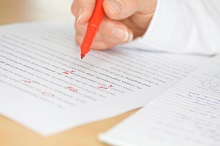Good Quality Proofreading - The Key to Producing Excellent Translation
March 23, 2015

A proofreader can make the same amount of difference to the quality of a translation as the translator. The role of the proofreader is to check the translation draft and make any revisions necessary in order to make the final product polished and accurate.
A translation that was good to begin with can be made better and even excellent with polishing up by a proofreader. It is the proofreader's job to improve the quality of the translation.
Proofreading Basics
After the text has been translated, the proofreader checks the translation. At Arc Communications, work translated by a native English speaker is proofread by a native Japanese speaker. In the same manner, work translated by a native Japanese speaker is proofread by a native English speaker. The same applies to other languages. This way, anything needing revision can be discovered through the different viewpoints of the translator and the proofreader.
Let's look at basic items on a proofreading checklist:
- Are there any mistranslations?
- Are there any omissions?
- Are there any deviations of word choices for the same source word?
- Are there any inconsistencies in terminology, especially when more than one translator has worked on the text?
- Has the glossary been used appropriately? (When a glossary has been provided by the client)
- Have proper nouns been translated correctly?
- Are there any grammatical mistakes?
- Are there any mistakes with numbers?
As well as the above, checking headers, footers, page numbers and layout are also part of a proofreader's job.
Proofreaders Need these Qualities and Abilities
Linguistic ability is essential because proofreaders have to compare the source text with the translation and make any necessary revisions. Making the translation reflect meaning accurately requires a good sense of understanding and a good sense of language to use appropriate expressions in the target text.
Attention to detail is required for doing research to justify correct choices for words. Only translators who have had a lot of experience with various texts can make the step up to becoming an excellent proofreader. However, the reality is that unfortunately many proofreaders are would-be translators who are studying on the job as they merely check for omissions or mistranslations. People tend to think that proofreading is easy but they need to realize that proofreading is what makes a big difference to the quality of the final translation.
Proofreading is Not Easy
Mistakes such as omissions and spelling errors are easy to spot and can be handled with a fair amount of linguistic ability and attention to detail. However, a higher level of proofreading requires a thorough understanding of the gist of the source text and deciding on the best word choices to suit the translation. To that end, it is sometimes necessary to revise translations which are technically not wrong. Confidence and solid justification enable the proofreader to make such difficult decisions without hesitation.
This kind of good quality proofreading is the key to producing excellent translation.
Proofreaders Deserve More Recognition
Proofreading is not as glamorous a job as translation but good quality proofreaders are essential for producing good quality translation.
Rather than taking up proofreading work first and studying with the aim of becoming a translator, good translators should widen their sphere of activity with proofreading. If this trend caught on, it would greatly contribute to raising the level of the entire translation industry.
Related Services
| << Quality Control in Translation | Maximizing Hits from Multilingual Searches! SEO Strategies for Multilingual Sites >> |
To Contact Us Regarding Our Translation Services
For urgent needs, call:
+81-3-5730-6133
